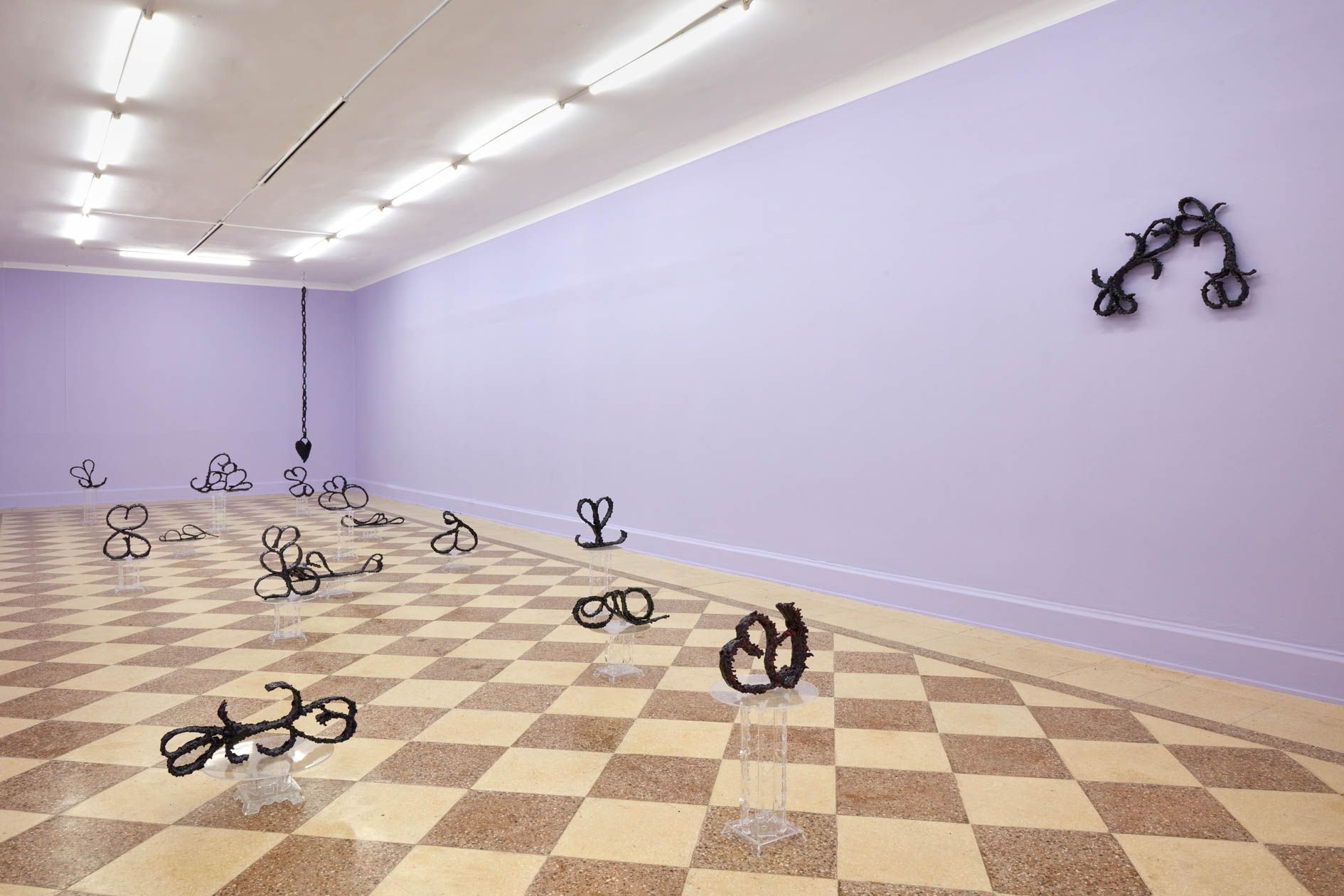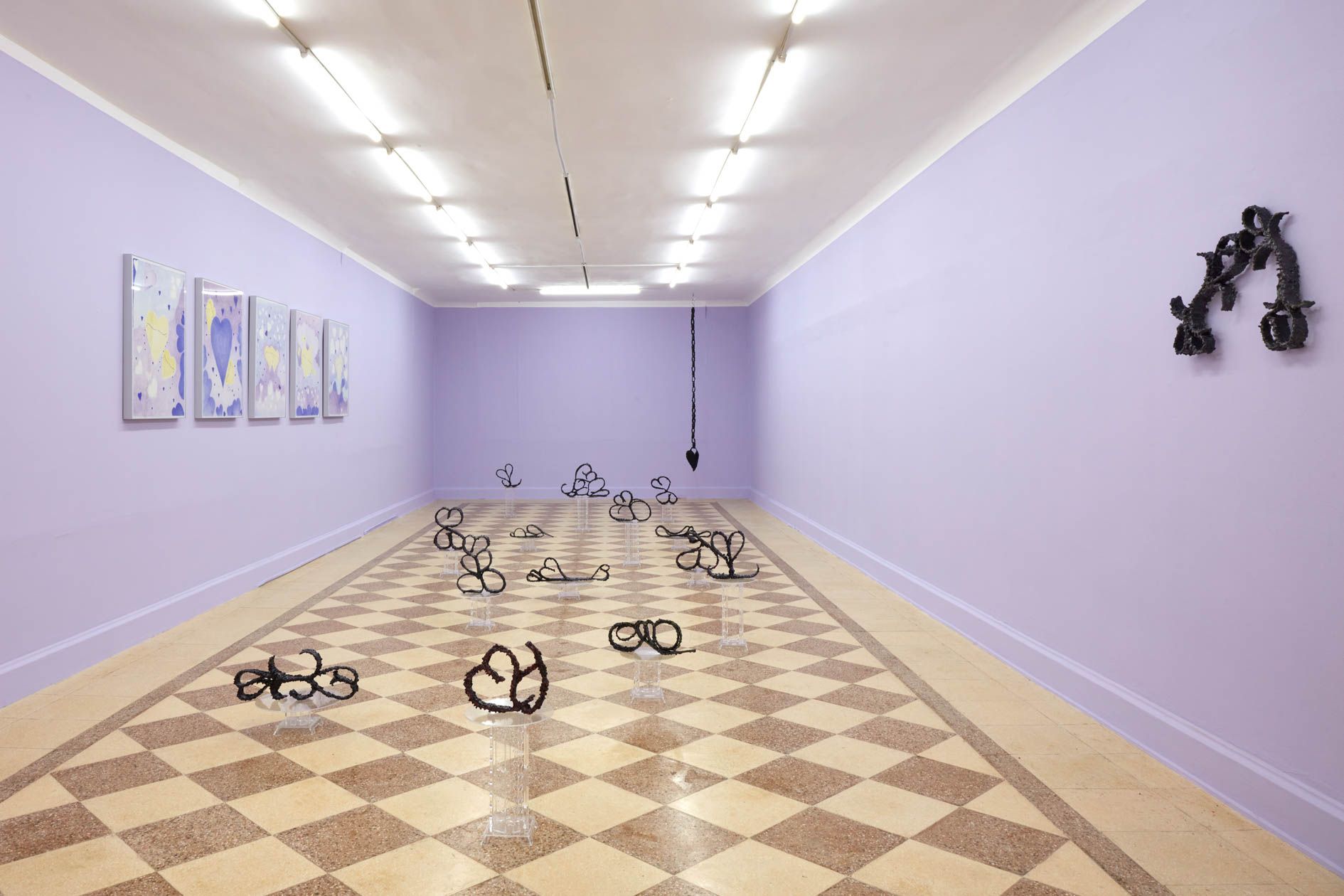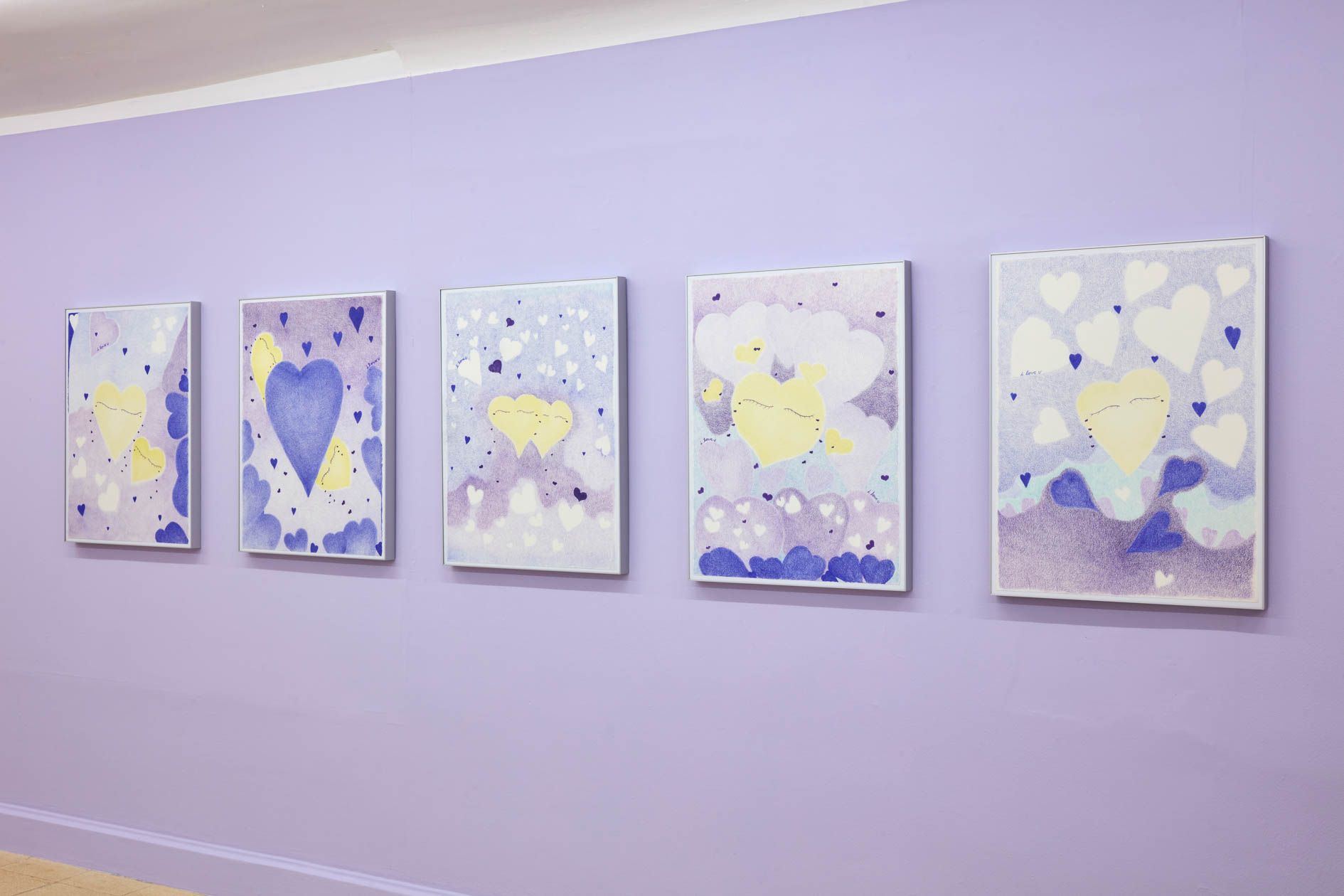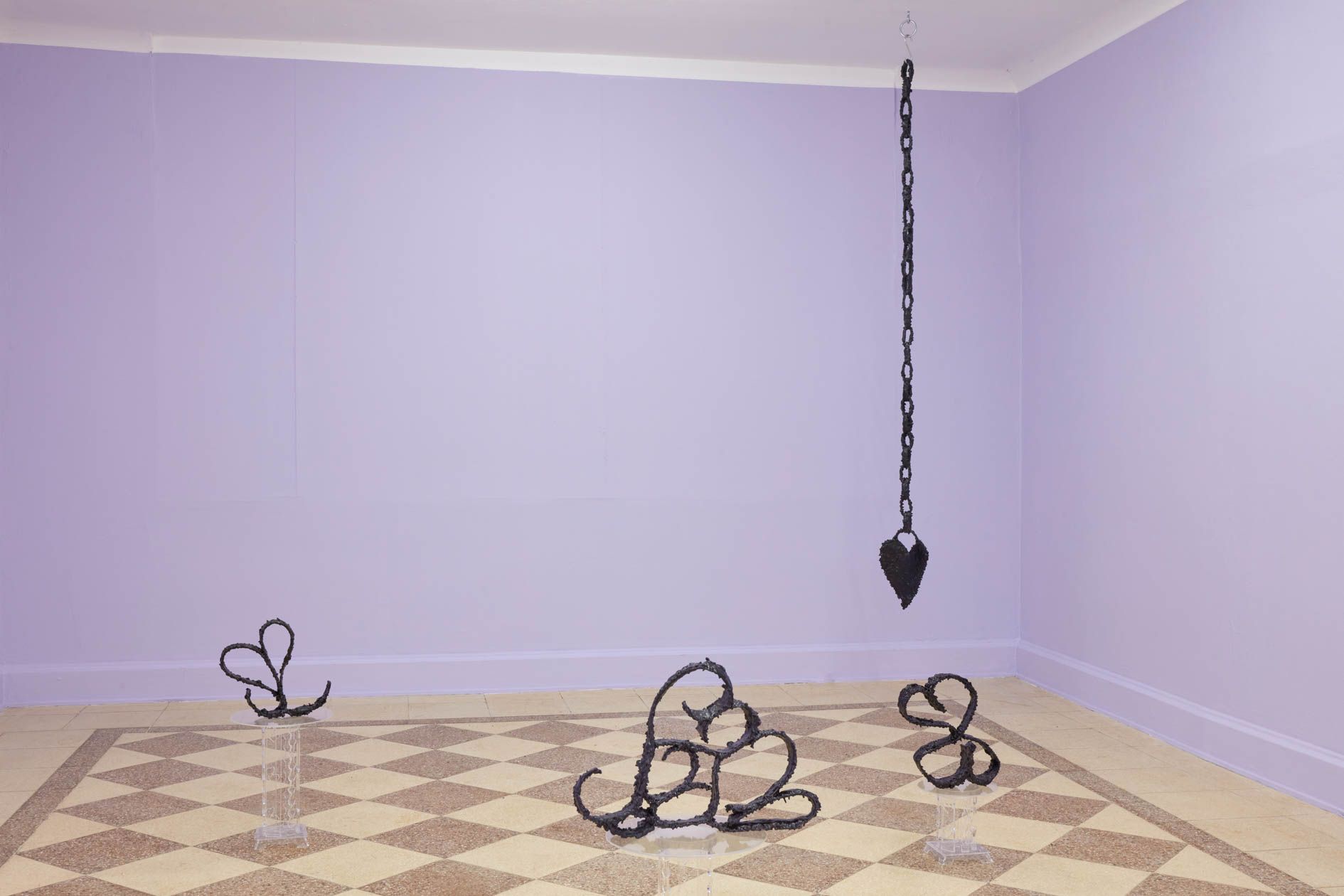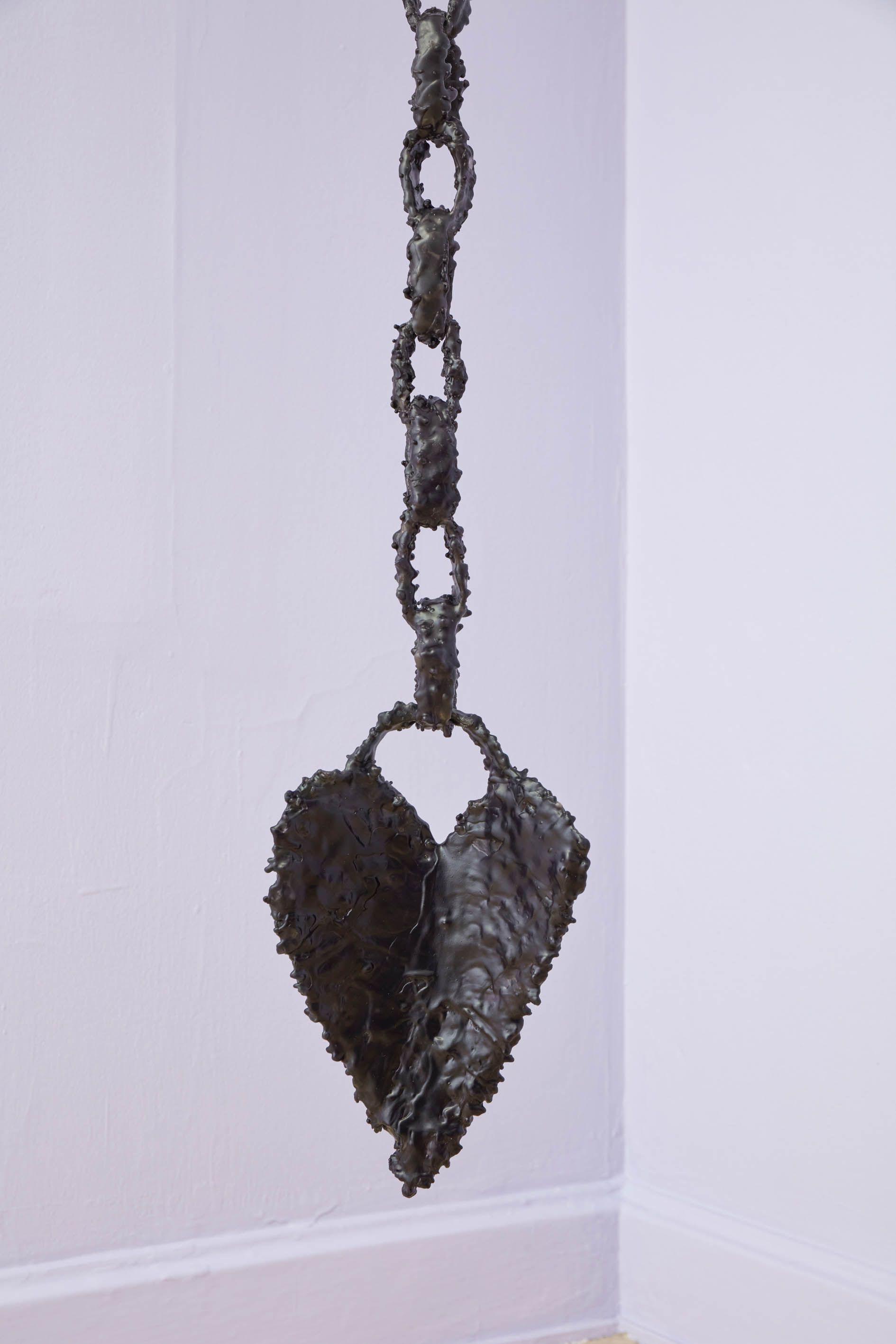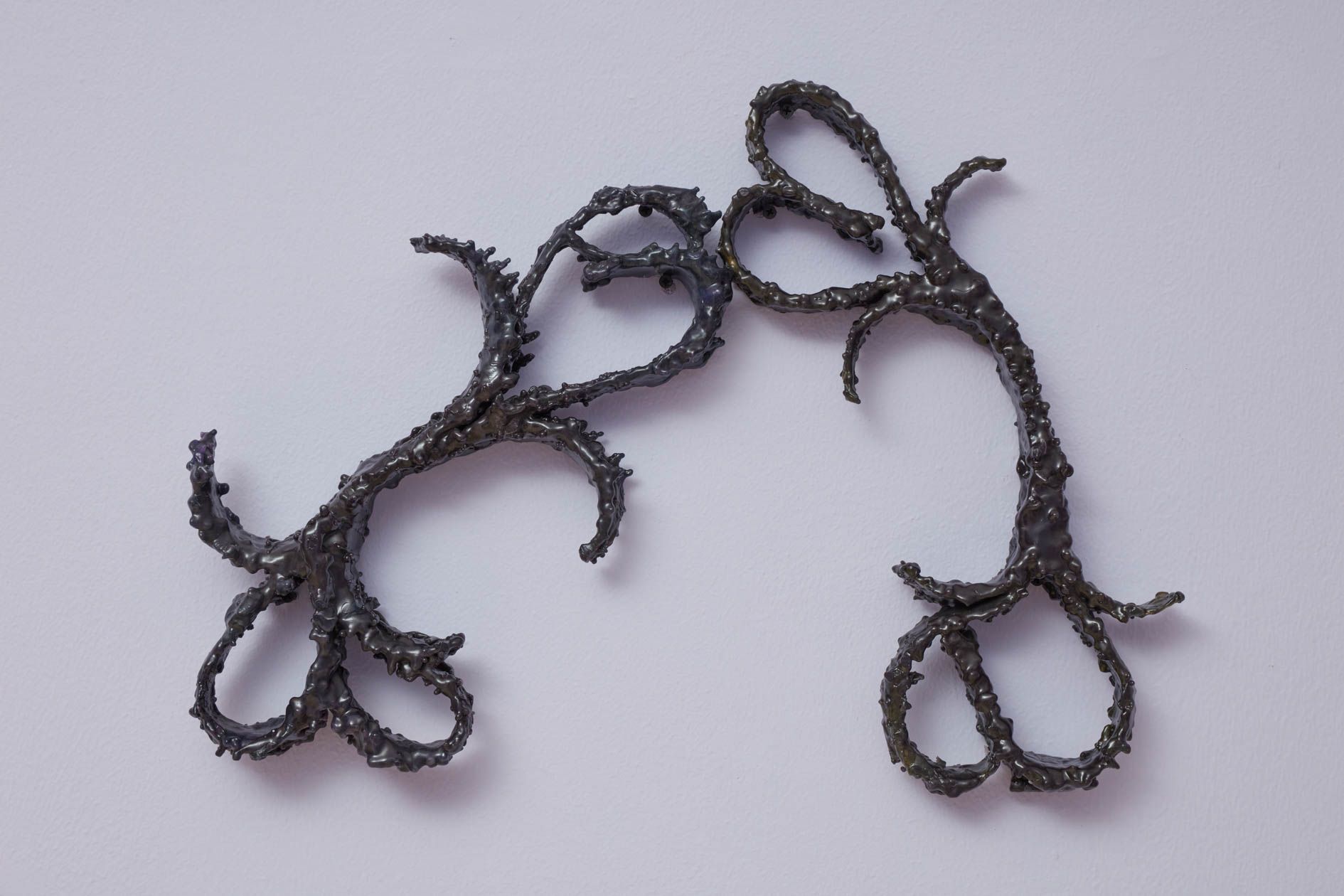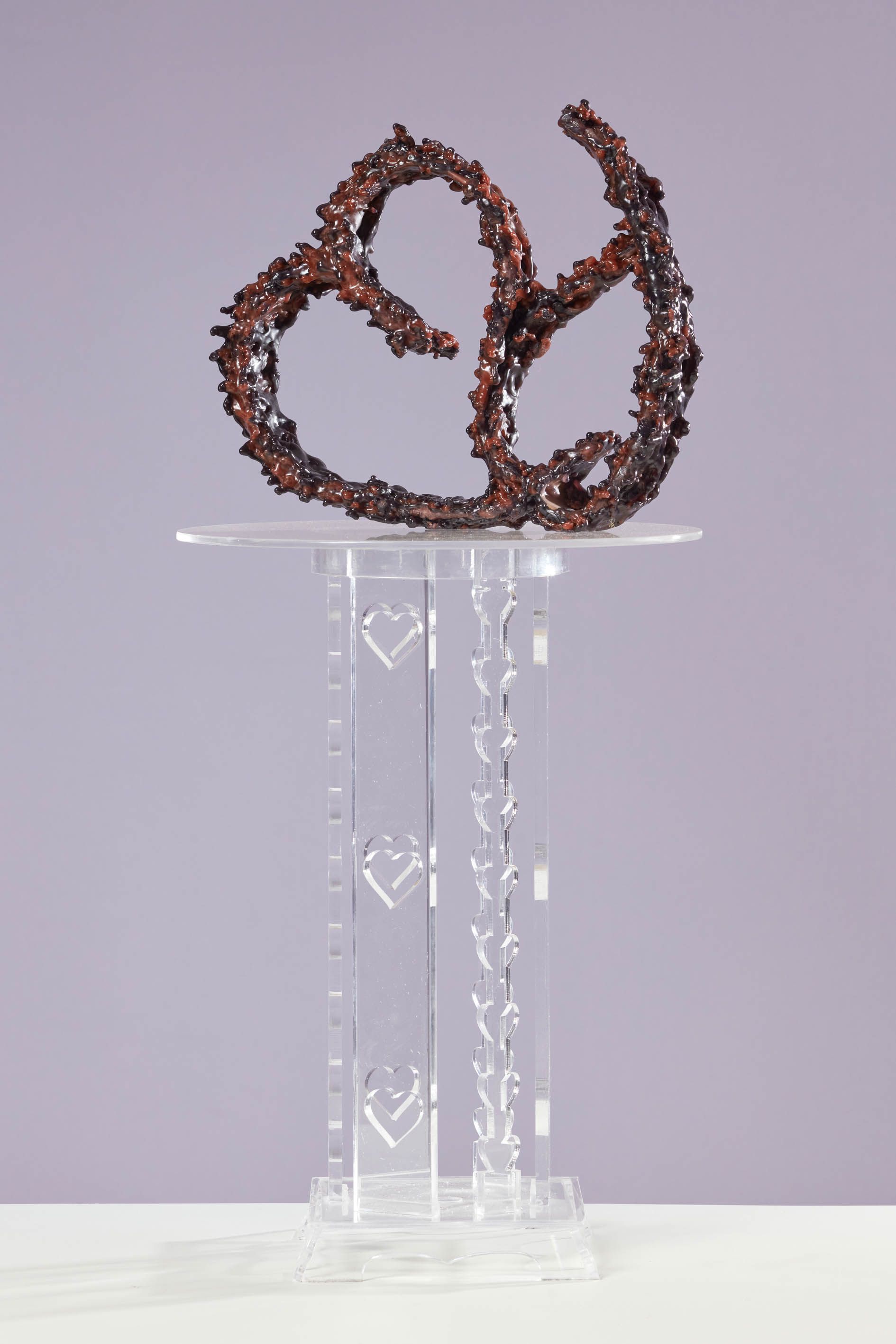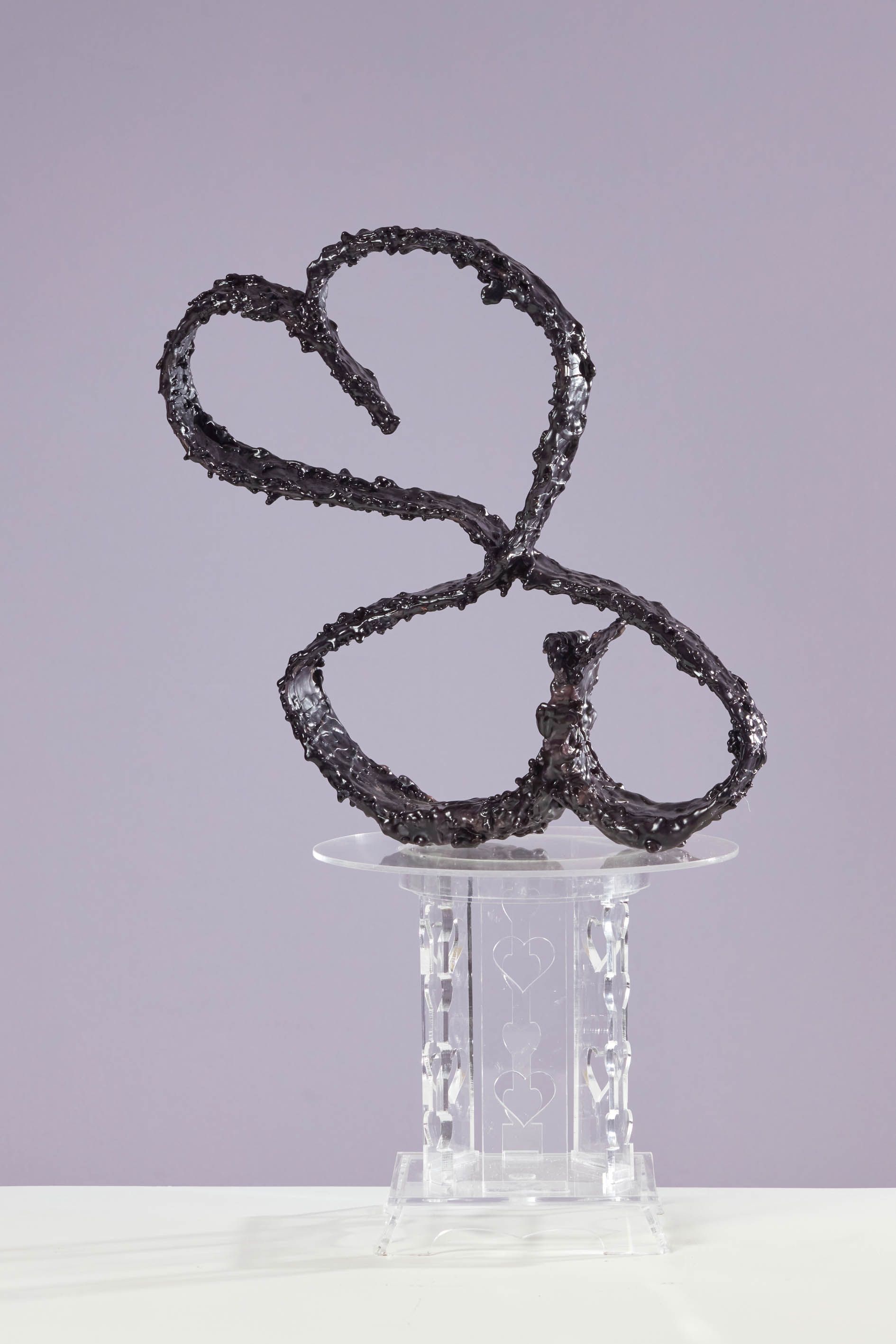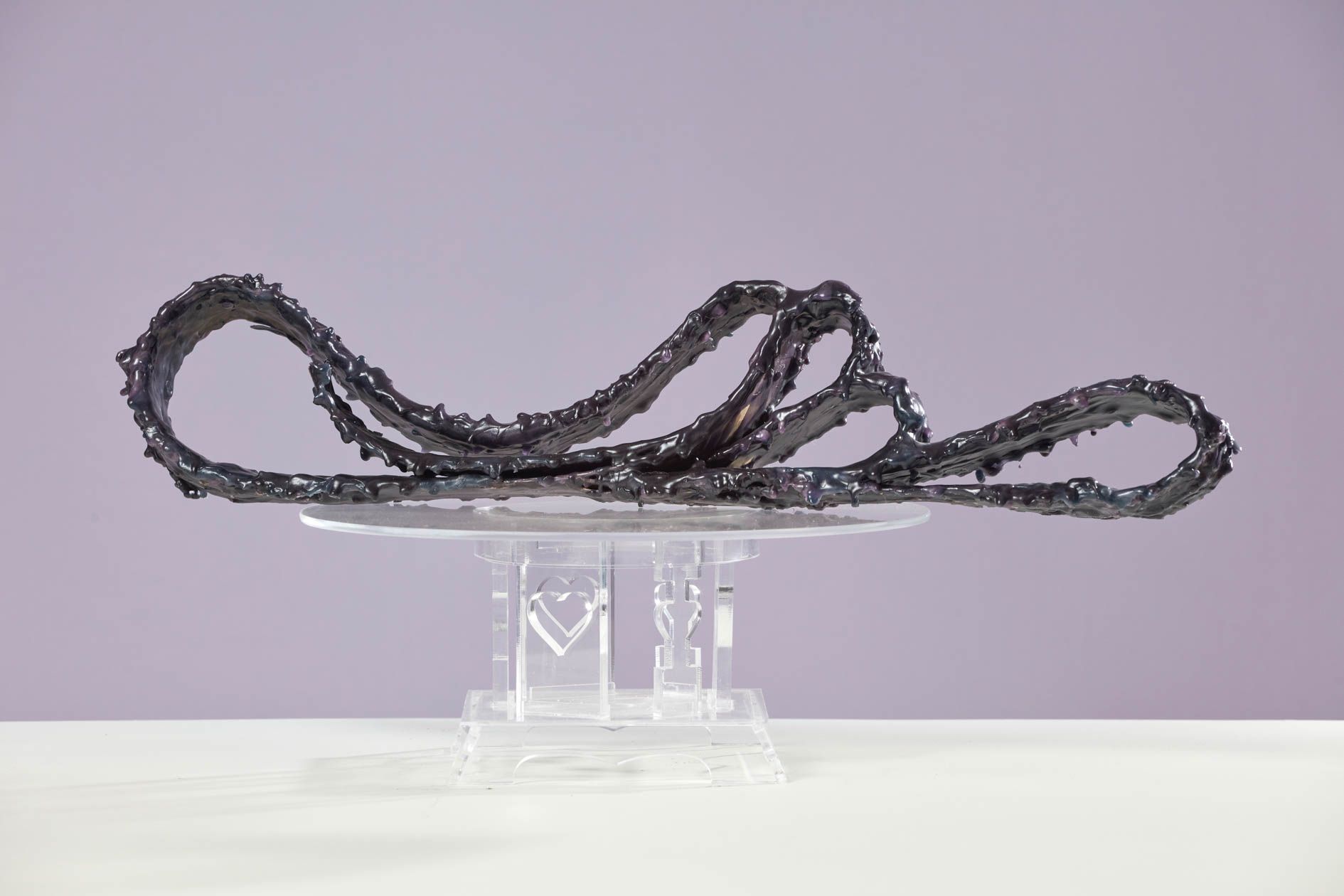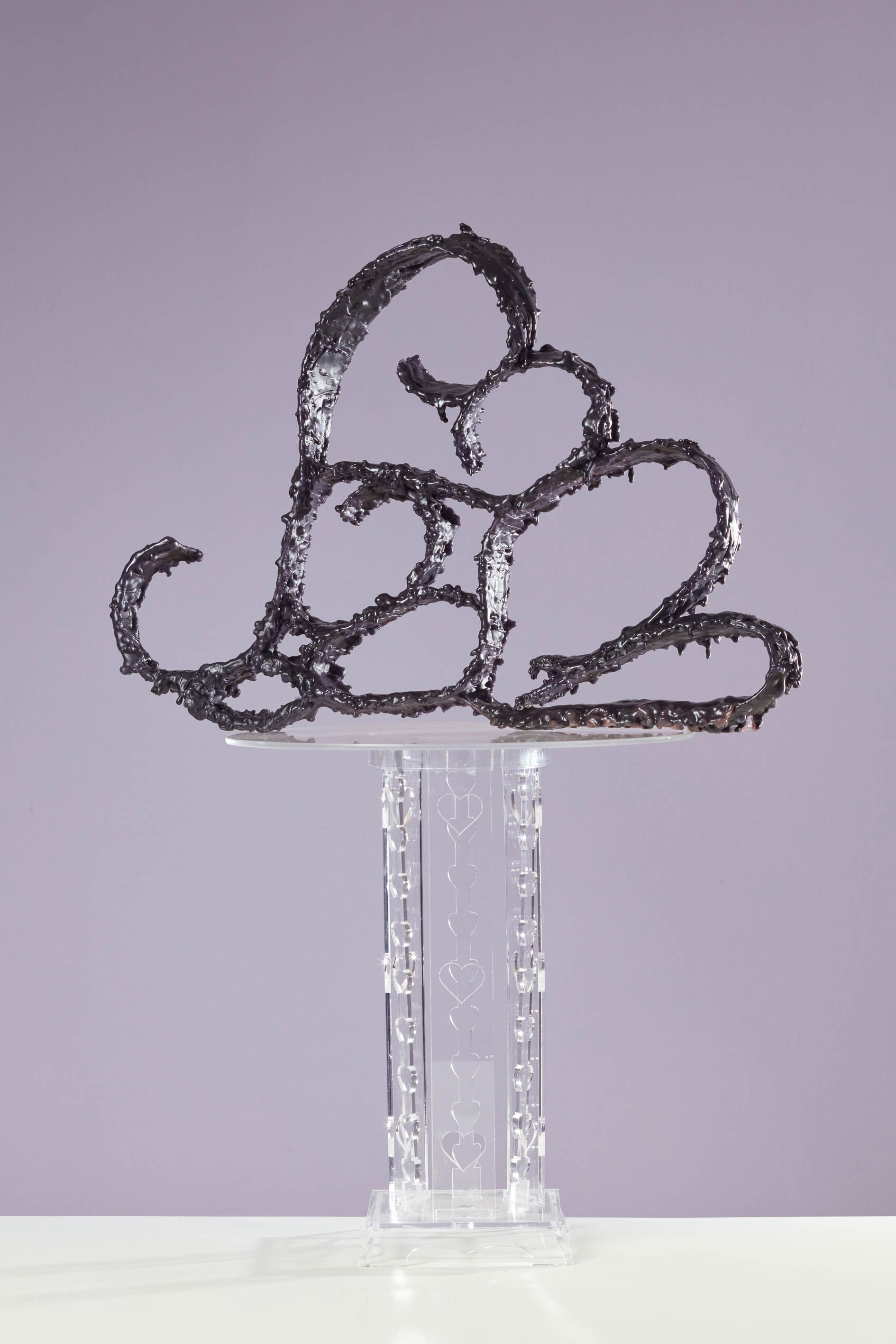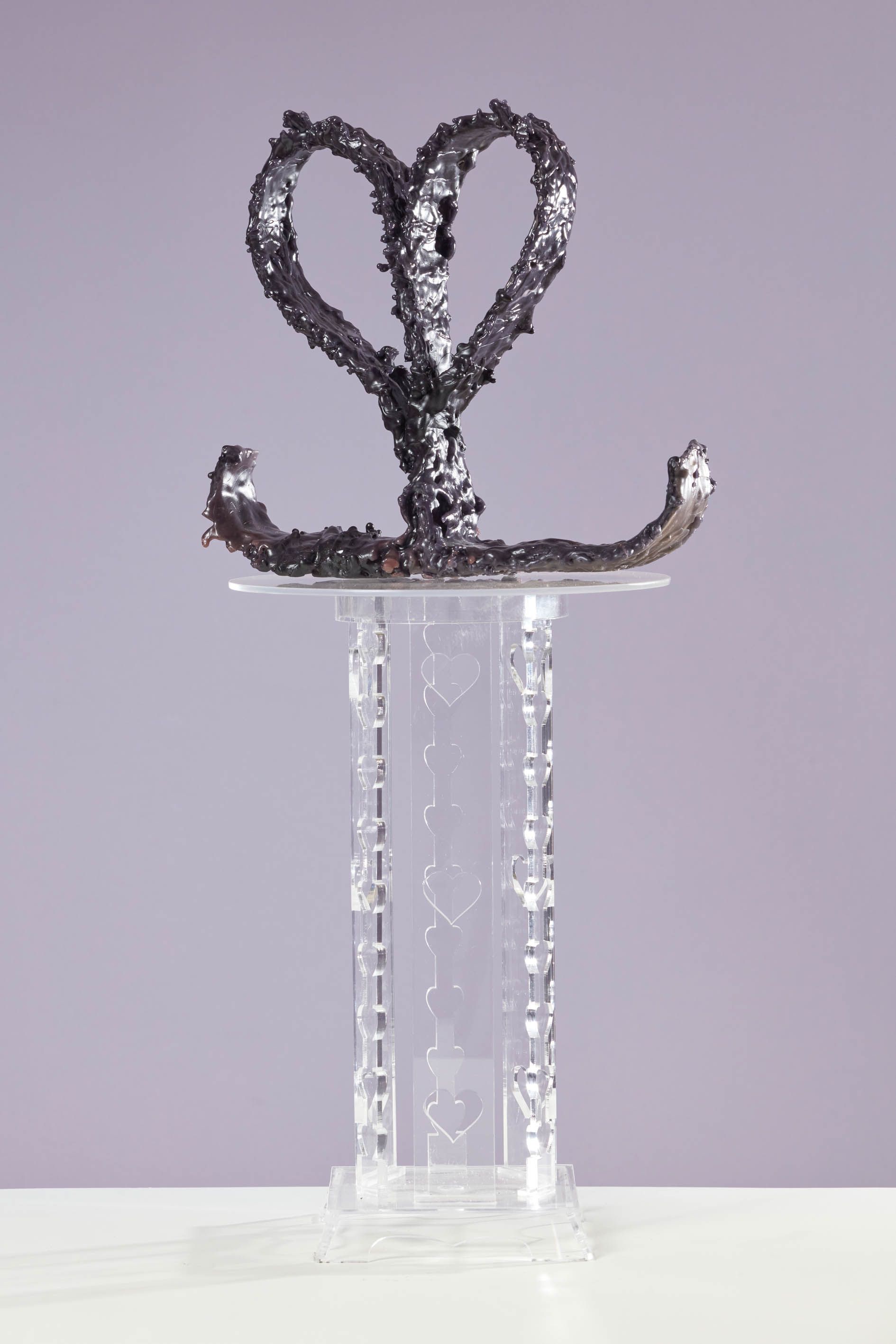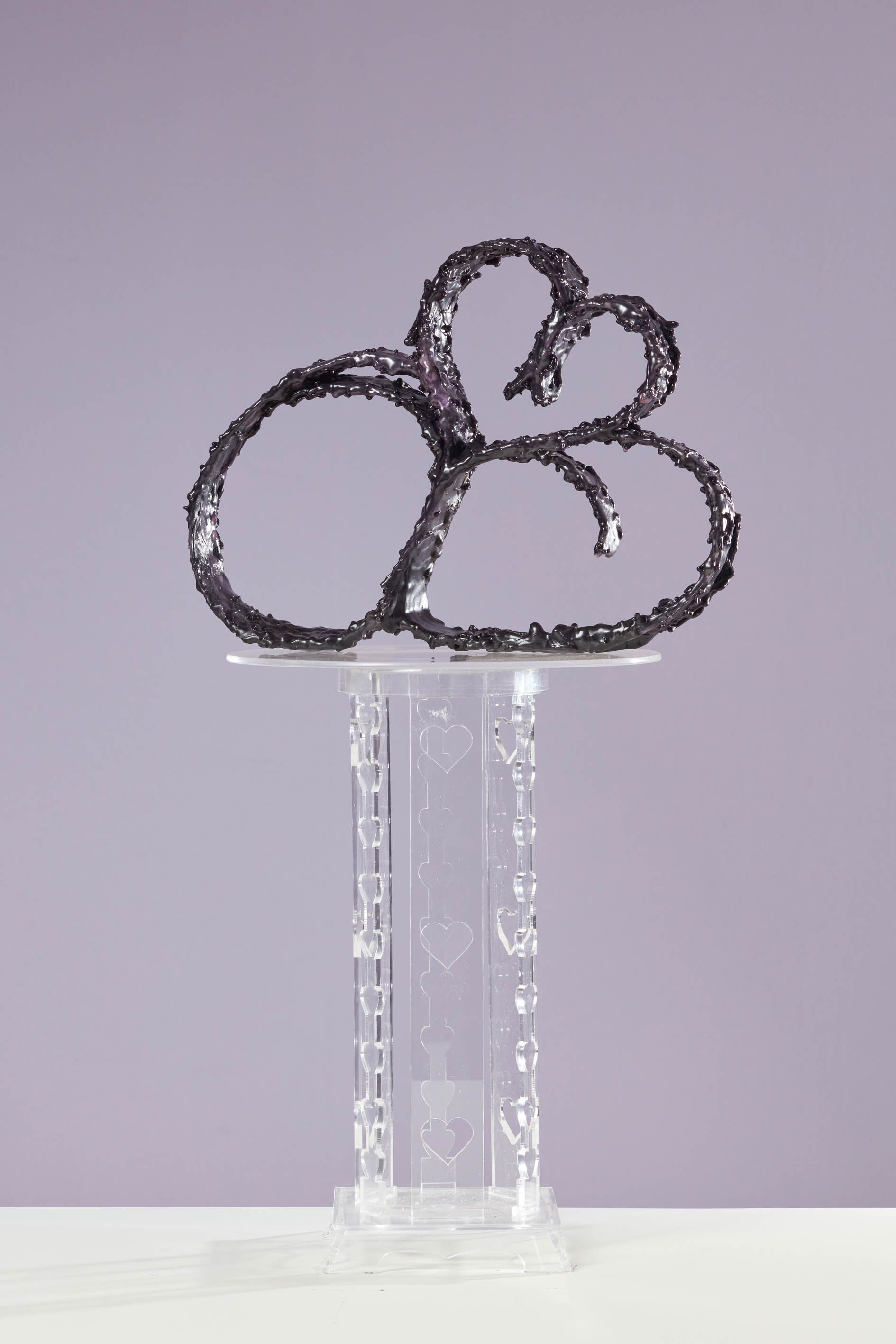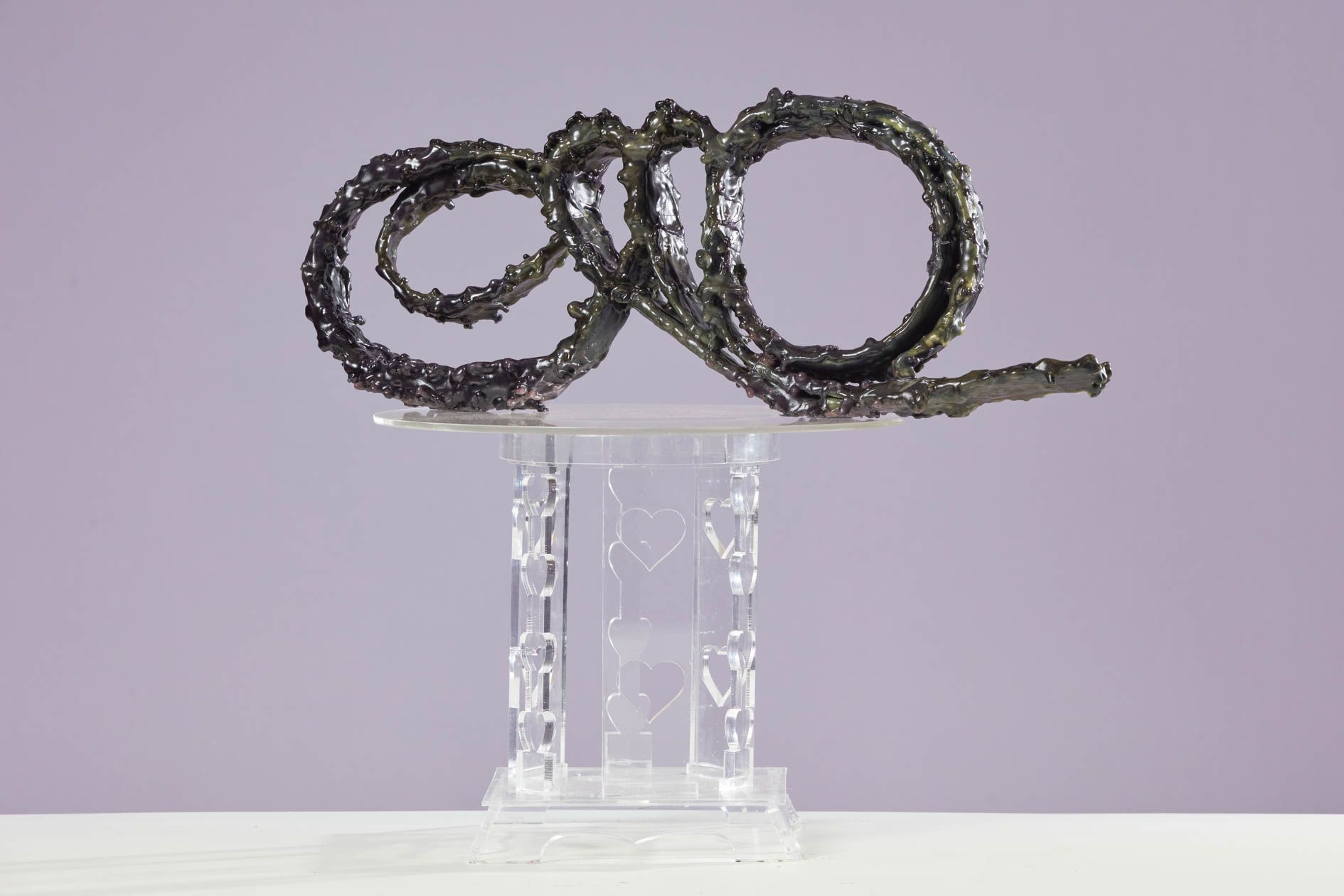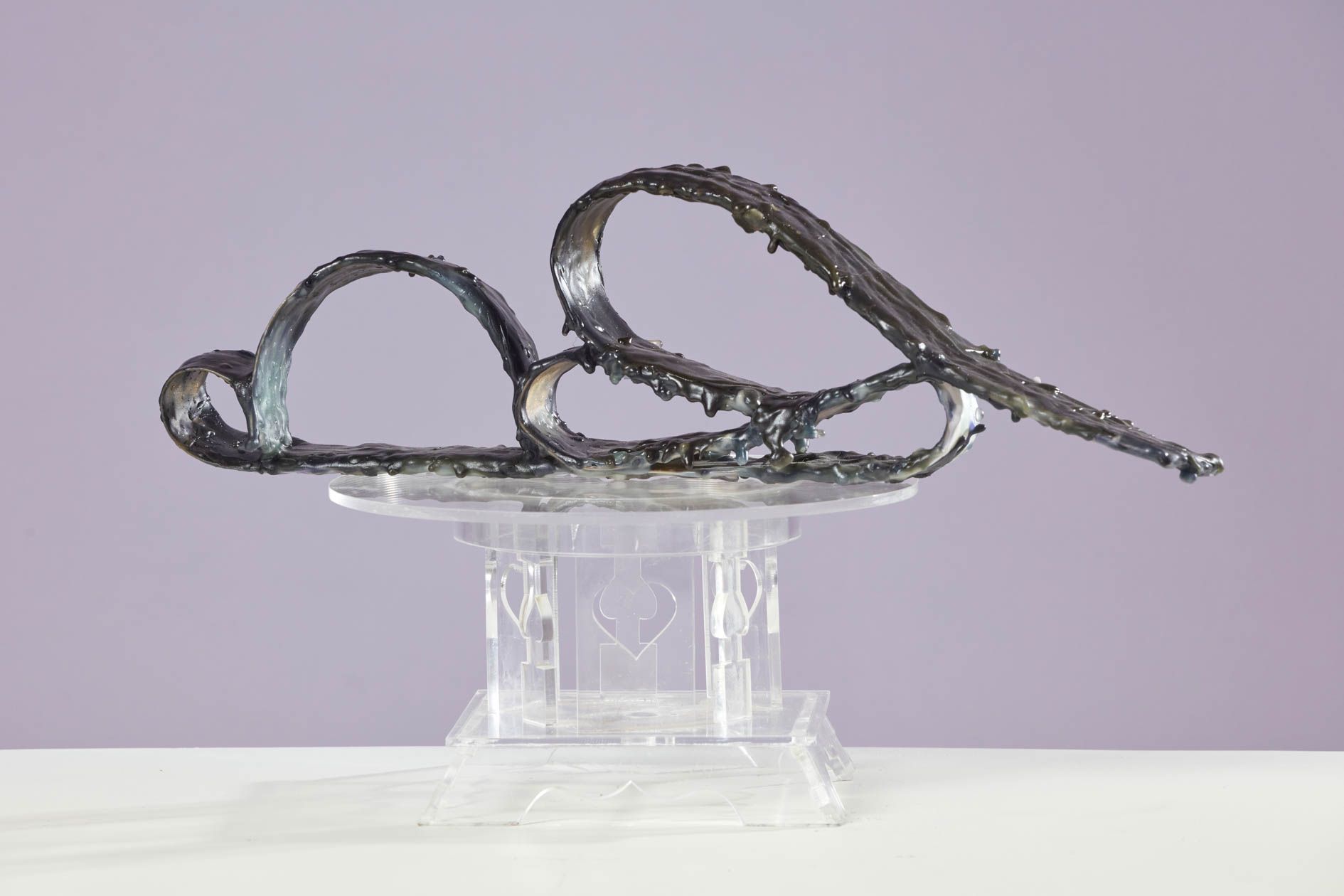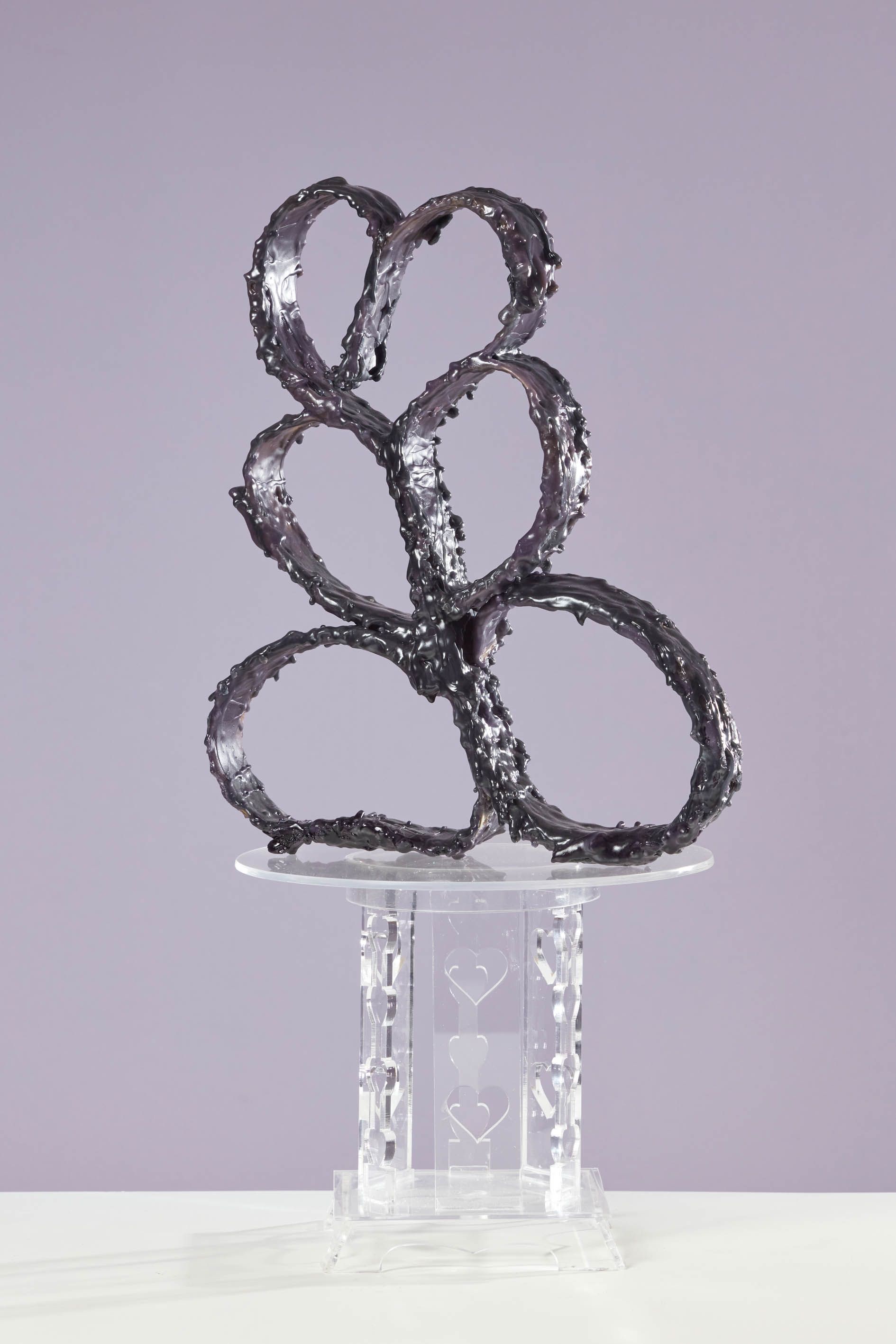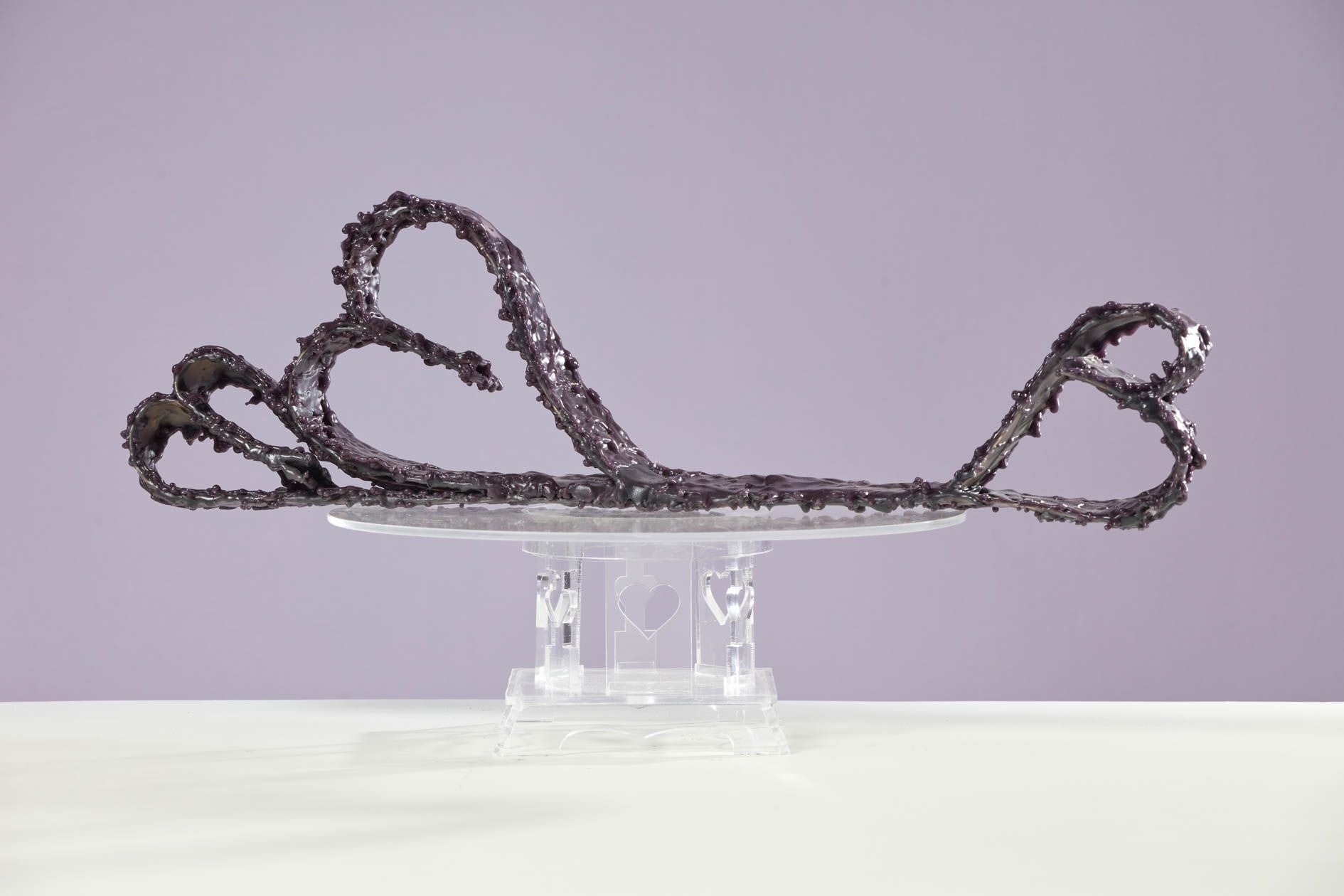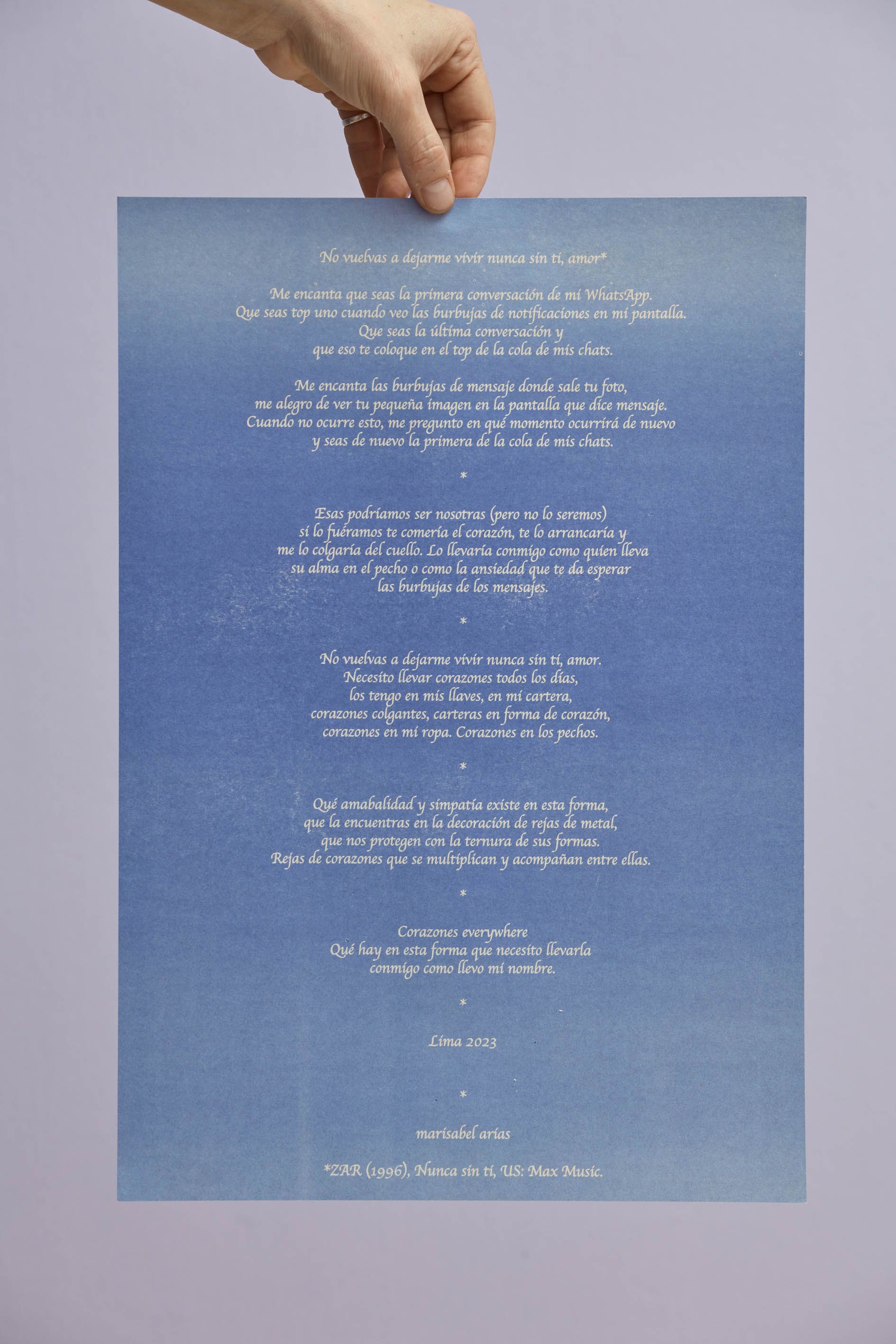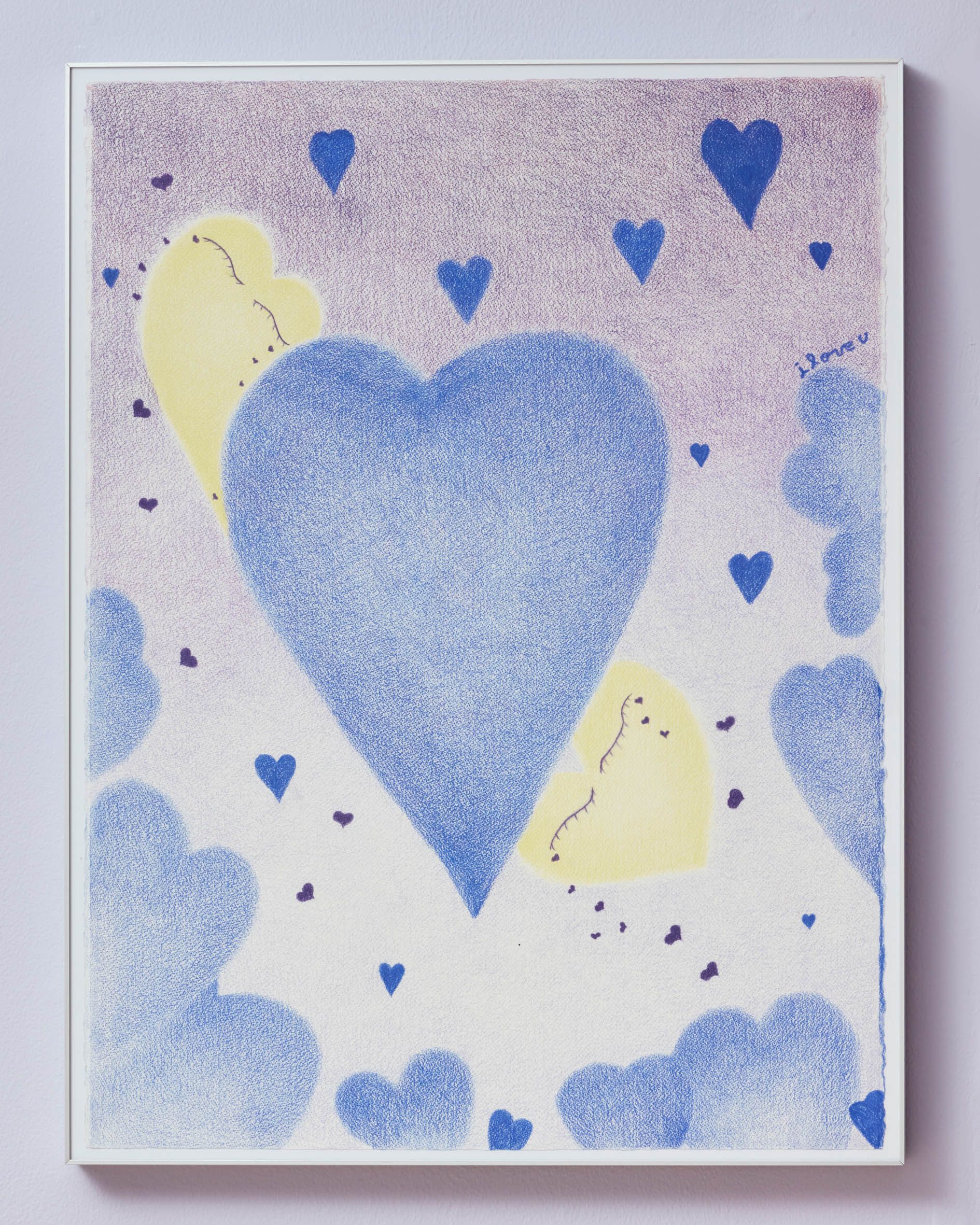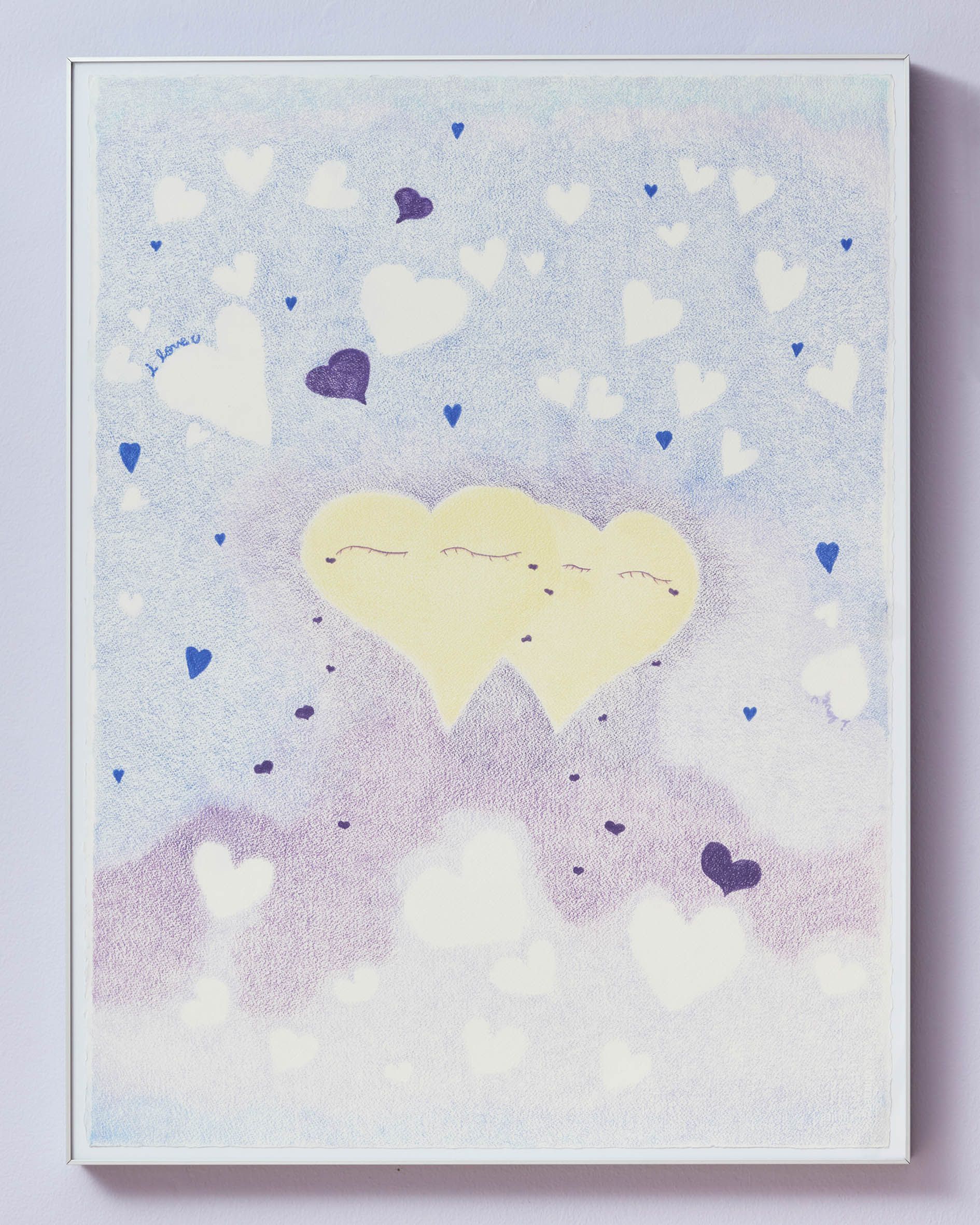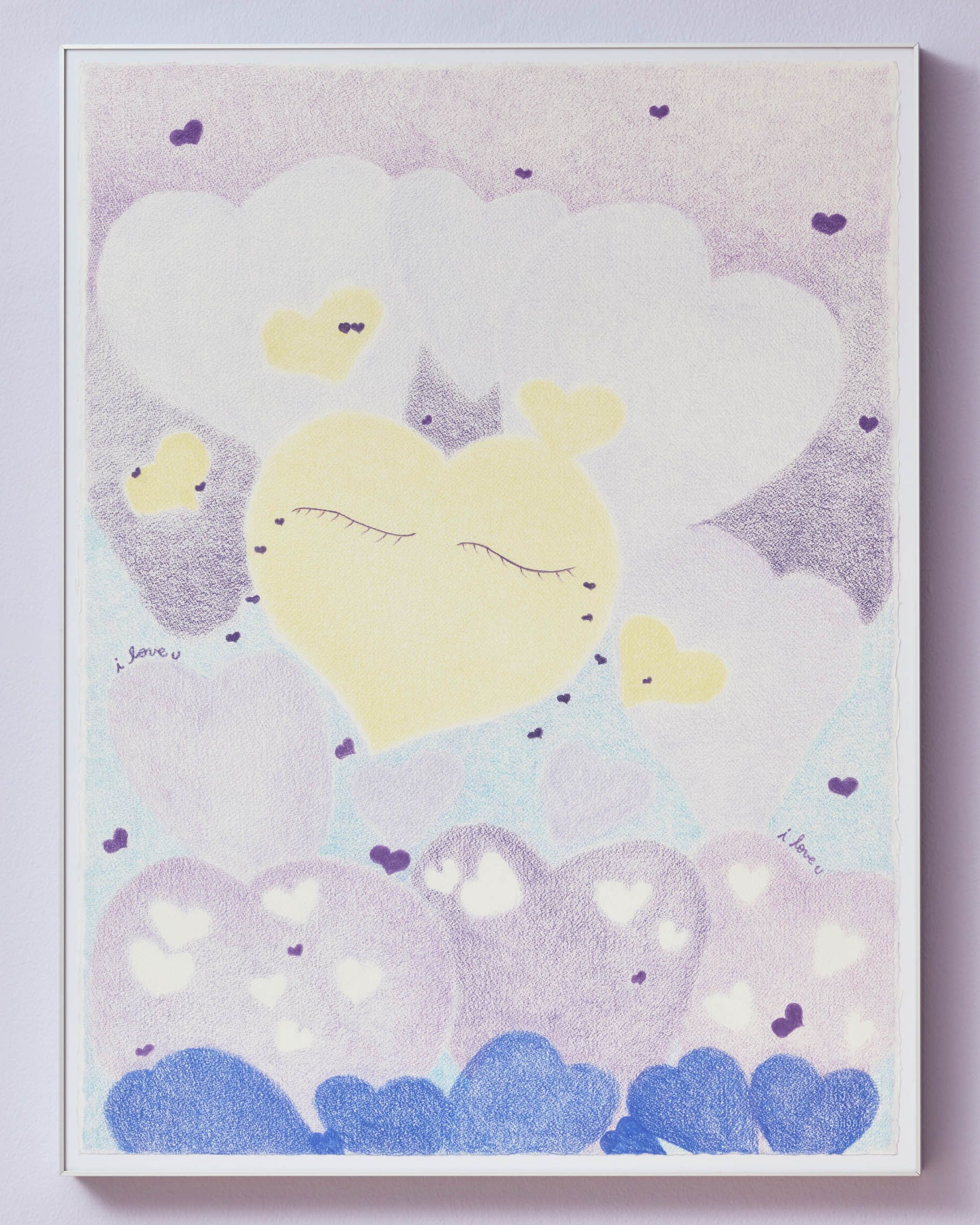“Es amor, ansiedad, pasión, deseo, locura… todo eso siento por ti.
Te quiero Paulina. Te quiero Paulina. Te necesito vida mía”
Fragmento de La Usurpadora. Capítulo final.
A pesar de su fascinación por las telenovelas de los noventas, Marisabel nunca encontró ningún tipo de representación en ese universo, en el que el amor parece pertenecerles exclusivamente a las parejas heterosexuales y normativamente “bellas”. Intuyo que su fijación casi obsesiva hacia las representaciones más populares del amor está estrechamente relacionada con una contradicción que encuentro muy común en la construcción de identidades -principalmente- femeninas de una misma generación en América Latina: nos identificamos profunda e irracionalmente con una industria del espectáculo que, en la mayoría de casos, no nos representa.
Hace ya algún tiempo, la artista reconoce corazones donde suelen pasar desapercibidos: tapetes de hule en el transporte público, grabados en las veredas de cemento y, particularmente, en los ornamentos de las rejas que separan a la ciudad de Lima de los vidrios de sus casas. Su aproximación a estos elementos tan característicos del paisaje urbano es, más que formal o estética, afectiva. Marisabel extrae estas formas, las recompone, aísla a las una de las otras, las estira, las deforma. Las hace vulnerables. Lo que alguna vez fue rígido, ahora parece derretirse en medio de la sala de exposición. Los corazones de hierro que componían una barrera impenetrable, ahora parecen buscarse entre sí desesperadamente.
Me da la impresión de que estos ejercicios (casi compulsivos) de repetición y transformación de la misma forma son el resultado de una búsqueda muy personal – que a la vez podemos sentir cercana- y de una necesidad imperante de entender el amor desde sus propias experiencias. Las piezas en esta exhibición parecen transitar entre la euforia y el dolor de ida y de vuelta. Pienso en cada obra de Marisabel como un capítulo nuevo de su propia historia. Más precisamente de su propia telenovela. Una en la que la protagonista no es una mujer blanca heterosexual disfrazada de persona empobrecida que se enamora de un hombre rico y así logra la felicidad, sino alguien que ama de manera intensa, ansiosa, a veces torpe, pero sobre todo libre; o como ella diría: “una historia de amor lésbica, casi ficticia, entre las rejas y los deseos que están detrás de esos corazones”.
No es gratuito que el título de esta entrega sea también la estrofa principal de “Nunca sin ti” de ZAR, canción que ha estado escuchando en loop durante los últimos meses. La relación de Marisabel con la cultura pop y, en general, lo que ha sido masivamente comercializado, es esencial en su práctica. Ella camina por las calles de Lima y va recolectando experiencias, materiales y formas comunes que luego utiliza como materia prima, resaltando la belleza de aquello que a menudo no vemos. Esto nos permite un fácil acceso a su imaginario. El suyo es un arte para todo público.
Fátima Rodrigo
Lima 2023.
No vuelvas a dejarme vivir nunca sin ti, amor*
Me encanta que seas la primera conversación de mi WhatsApp.
Que seas top uno cuando veo las burbujas de notificaciones en mi pantalla.
Que seas la última conversación y
que eso te coloque en el top de la cola de mis chats.
Me encanta las burbujas de mensaje donde sale tu foto,
me alegro de ver tu pequeña imagen en la pantalla que dice mensaje.
Cuando no ocurre esto, me pregunto en qué momento ocurrirá de nuevo
y seas de nuevo la primera de la cola de mis chats.
*
Esas podríamos ser nosotras (pero no lo seremos)
si lo fuéramos te comería el corazón, te lo arrancaría y
me lo colgaría del cuello. Lo llevaría conmigo como quien lleva
su alma en el pecho o como la ansiedad que te da esperar
las burbujas de los mensajes.
*
No vuelvas a dejarme vivir nunca sin ti, amor.
Necesito llevar corazones todos los días,
los tengo en mis llaves, en mi cartera,
corazones colgantes, carteras en forma de corazón,
corazones en mi ropa. Corazones en los pechos.
*
Qué amabalidad y simpatía existe en esta forma,
que la encuentras en la decoración de rejas de metal,
que nos protegen con la ternura de sus formas.
Rejas de corazones que se multiplican y acompañan entre ellas.
*
Corazones everywhere
Qué hay en esta forma que necesito llevarla
conmigo como llevo mi nombre.
*
Lima 2023
*
marisabel arias
*ZAR (1996), Nunca sin ti, US: Max Music.
“It’s love, anxiety, passion, desire, madness… I feel all of this for you.
I love you Paulina. I love you Paulina. I need you my love”.
Fragment from La Usurpadora. Final episode.
Despite their fascination with nineties telenovelas, Marisabel never found themself portrayed in this universe in which love seemed to belong exclusively to heterosexual and ideally
“beautiful” couples. I sense that their almost-obsessive fixation towards the most post popular love depictions is closely linked to a contradiction that I find fairly common in the formation of -mainly- feminine identities from the same generation in South America: We profusely and irrational identify ourselves by an industry of spectacle that, in most of the cases, doesn’t represent us.
For some time now, the artist has been recognising heart shapes where they usually go unnoticed: rubber mats in public transport, printed in cement pavements and, particularly, in ornaments from fences that divide the city of Lima from the window glass of its houses. Their approximation to these elements, so characteristic of the urban landscapes is, more than formal or aesthetic, an affective one. Marisabel subtracts these shapes and reassembles them, isolating ones from the others, stretches them, distorts them. Makes them vulnerable. What once was rigid now seems to melt down in the middle of the exhibition room. The iron hearts that once constituted an impenetrable barrier now seem to be looking for each other desperately.
I have the impression/the feeling that these (almost compulsive) exercises of repetition and transfiguration of the same shape are the outcome of a deeply personal search -which we can feel close to us at the same time- and from an imperative need to understand love from their own experiences. The pieces in this show seem to navigate between euphoria and the pain of come and go/back and forth. I think of each piece/work of art from Marisabel as a new chapter in their own story. Most precisely, from her own telenovela. One where the main character isn’t a white heterosexual woman disguised as an impoverished person that falls in love with a rich man and in that way reaches happiness, but as someone who loves intensely, anxiously, sometimes clumsily, but above all, freely, or in their own words/as they would say: “a lesbian love story, almost fictional, between fences and desires that lie behind our hearts.”
It’s not coincidental that the title for this work is also the main verse of “Nunca sin ti” (Never without you) from ZAR, a song that they have been listening to on loop during these last months. The relationship Marisabel has with pop culture and in general, with what has been massively commercialised, is essential to her practice. They walk around the streets of Lima while recollecting experiences, resources and common shapes that they later use as raw material, highlighting the beauty of what we usually don’t see. This allows us an easy access to their imagery. Theirs is an art for everyone.
Fátima Rodrigo
Lima 2023
Don't ever let me live without you again, love*
I love that you're the first on my WhatsApp conversations.
That you're the top one when I see the notification bubbles on my screen.
That you're my last exchange and
That puts you at the top of the queue of my chats.
I love the message bubbles with your picture in them,
I'm glad to see your little photos on the message screen.
When this doesn't occur, I wonder when it will happen again
and you will be at the top of my chat once more.
*
That could be us (but it won't be)
if we were, I'd consume your heart, rip it out, and put it around my neck.
I'd carry it with me like someone who carries
their soul in their chest or like the anxiety you get from waiting for
the bubbles of the messages.
*
Don't ever let me live without you again, love.
I need to carry hearts every day,
I have them on my keys, inside my wallet,
hanging hearts, heart-shaped wallets,
hearts on my clothes. Hearts on top of breasts.
*
What kindness and sympathy exists in this shape,
that you find it in the decoration of metal fences,
that protect us with the tenderness of their shapes.
Heart-shaped grillwork that multiply and accompany each other.
*
Hearts everywhere
What is there in this shape, that I need to carry it
with me as I carry my name.
*
Lima 2023
*
marisabel arias
*ZAR (1996), Nunca sin ti, US: Max Music.
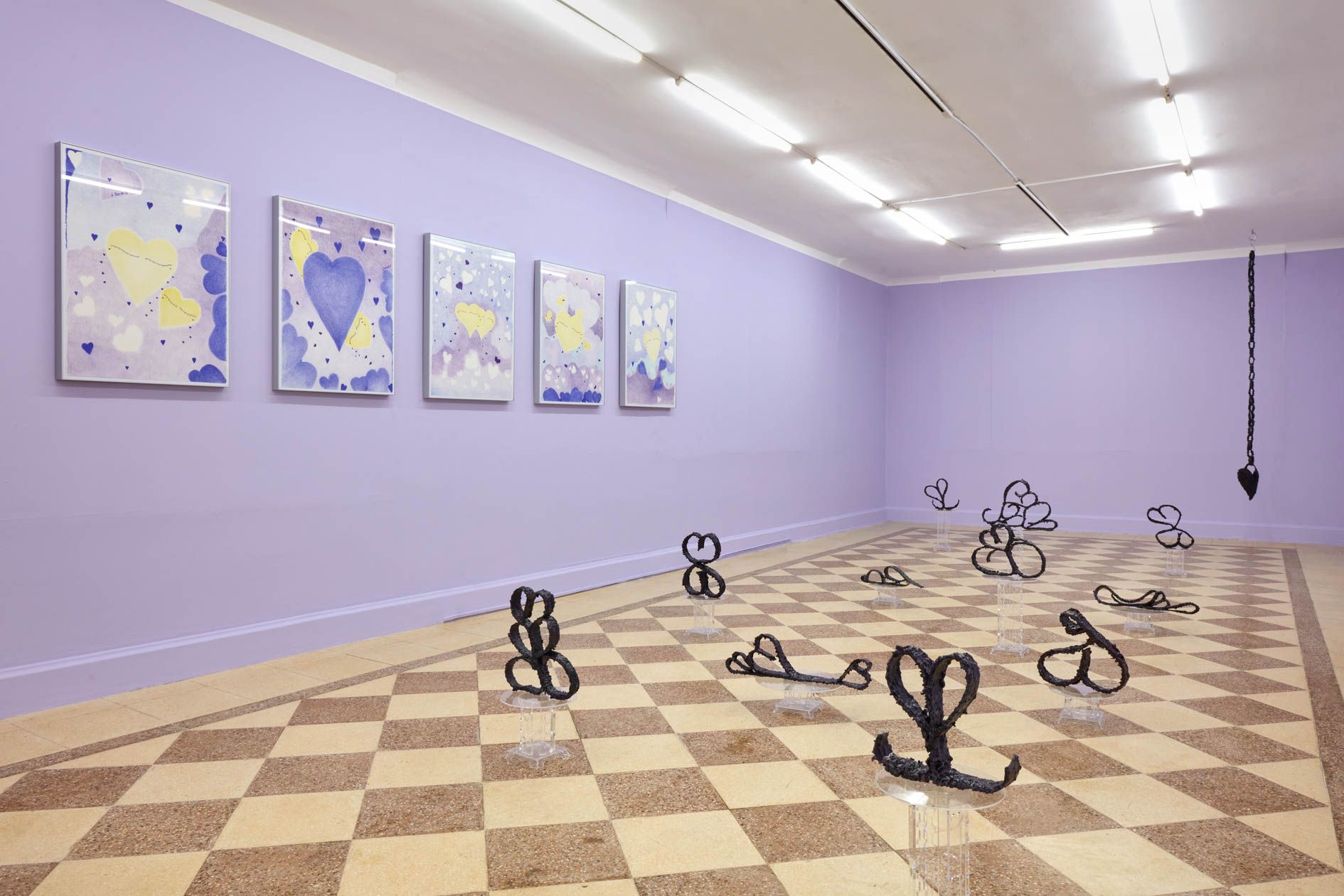
No vuelvas a dejarme vivir nunca sin ti, amor.
Cera de abeja, parafina, pigmentos de color, papel sulfatado,
dibujos en lapices de color sobre papel de algodón.
Vista de instalación 80m2 Livia Benavides, Lima
Fotos: Juan Pablo Murrugarra
